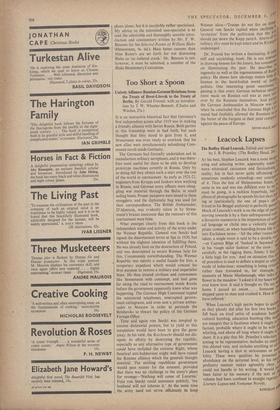Too Short a Spoon
Unholy Alliance: Russian-German Relations from the Treaty of Brest-Litovsk to the Treaty of Berlin. By Gerald Freund, with an introduc- tion by J. W. Wheeler-Bennett. (Chatto and Windus, 25s.)
IT is an instructive historical fact that Germany's first independent action after 1919 was in making a friendly alliance with Soviet Russia. Both parties to this friendship were in bad faith, but each thought that they stood to gain from it, and Stresemann was even ready to overlook that his new allies were simultaneously subsidising Com- munist revolt inside Germany.
The Germans had formally undertaken not to manufacture military aeroplanes, and it was there- fore most useful for them to be able to develop prototype machines covertly in Russia. Only by so doing did they obtain such a start over the rest of the world in rearmament. As early as 1921-22, engineers from Krupps and Junkers were working in Russia, and German army officers were smug- gling war material through the Baltic in small sailing boats. Proper passports were issued to these smugglers, and the diplomatic bag was used for their correspondence. The British Ambassador, D'Abernon, was evidently taken in by Strese- mann's brazen assurance that the rumours of this rearmament were false.
What emerges clearly from this book is the independent status and activity of the army under the Weimar Republic. General von Seeckt had signed the disarmament terms at Spa in 1920, but without the slightest intention of fulfilling them. He was already bent on the destruction of Poland, and was determined to secure Russian help for this, Communism notwithstanding. The Weimar Republic was merely a useful façade for him, a temporary expedient which would conceal his firm purpose to restore a military and imperialist State. He thus treated civilians and commoners like Stresemann with contempt, and had gone far along the road to rearmament inside Russia before the government apparently knew what was happening. The German High Command tapped the ministerial telephones, intercepted govern- ment cablegrams, and even sent a private ambas- sador to Moscow in order to persuade the Bolsheviks to thwart the policy of the German Foreign Office.
Time and again von Seeckt was tempted to assume dictatorial powers, but to yield to this temptation would have been to give the game away. In his view, the Reichswehr should not dis- sipate its efforts by destroying the republic, especially as any alternative type of government could have included the extreme Right, whose fanatical anti-bolshevism might well have ruined the Russian alliance which the generals thought essential. The existing republican government would pass muster for the moment, provided that there was no challenge to the army's plans for revenge—Nothing will come of Locarno,' Frau von Seeckt could announce publicly, 'my husband will not tolerate it.' At the same time the army need not strive officiously to keep Weimar alive—`Troops do not fire on tio05; General von Seeckt replied when declining 3 'invitation' from the politicians that the arlt) should put down the Kapp putsch. Above 017, military elite must be kept intact and its Korpgel' undamaged.
Dr. Freund has written a fascinating, if ratbe stiff and unyielding, book. He is not, interest in drawing lessons for the future, but concenuP4 on illuminating the past. He describes t"f ingenuity as well as the ingenuousness of Rust/ policy. He shows how ideology makes little . ference in the hard-boiled world of faell, politics. One interesting point mentioned ' passing is that every German technical develop ment made on Russian soil was at once ta/'t over by the Russians themselves. And Perll; the German Ambassador in Moscow was r'- when he concluded that the German High C'a' , mand had foolishly allowed the Russians to g. the better of the bargain in their joint consPitaL, against the peace of Europe.
DENIS MACK S 111














































 Previous page
Previous page